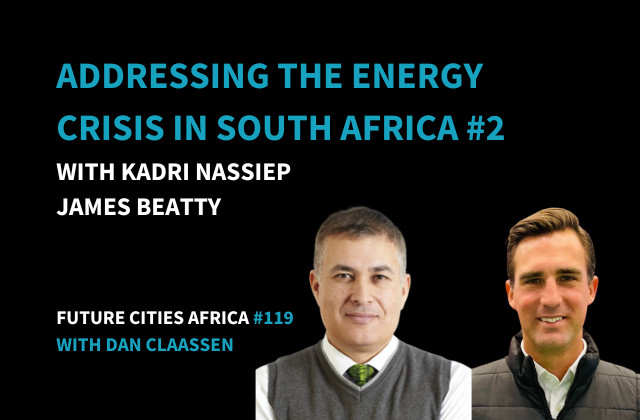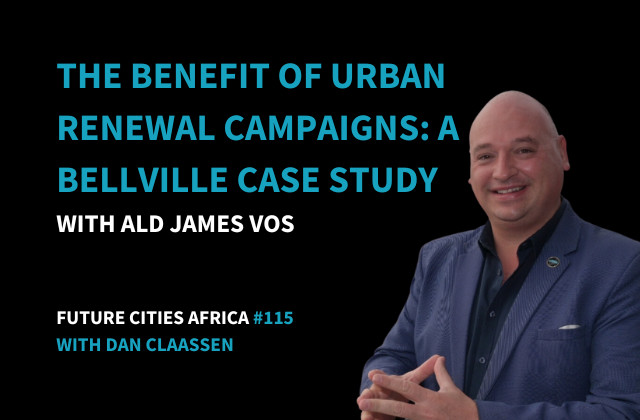Listen to Audio
Integrated Digital Mapping for Better City Management
Nicolaas Klopper is Director at 1map. We explore the National Property Register and its importance to the management of a city, how maps make complex data less abstract and provide actionable insights that drive revenue and improve service delivery, and how Mapping will be transformed as part of everyone’s workflow.
Stay Connected
Discussion highlights
This episode is presented in partnership with 1map (Visit them)
See how you can partner with Future Cities Africa
About 1map
- Online mapping company that makes national property register easily accessible.
- Help organisations link their data to produce actionable insights.
- Make complex multidimensional data less abstract, visualised and easy to understand.
- Local governments use 1map to make their financial system visualised on a map.
- Case study: R10 million in lost revenue identified by helping a large municipality reconcile their valuation roll with their billing system to identify inconsistencies between the market value and valuation roll value.
About the National Property Register
- Every property captured by the Surveyor General in a digital land parcel database that is linked to the title deeds information to indicate the legal status of a property.
- Spatial database of all the registered properties.
Why the National Property Register is important to the management of a city
- A city is a large complex property management company and about everything in a city ties back to the land parcels.
- Once a property is registered it becomes liable for rates and taxes, thus driving municipal revenue.
- It also becomes eligible for services from the municipality.
- Knowing where the properties are that you are responsible for managing, really is the essence of local government.
Maps make data less abstract
- Cities are complex with hundreds of thousands of data-points.
- The real world isn't points lines and shapes.
- Seeing areas where poor payment or service delivery is a problem is more effective than looking at a table thousands of rows and sorting high to low.
- The map is a scaled model of the real world.
Business Intelligence tools vs Maps
- BI tools summarise and aggregate the data and sometimes segment it. Then distill the data into charts and graphs.
- Maps provide actionable insights and are the complete picture.
- Maps can show inconsistent or corrupt data.
- Nicolaas discuss real-world examples.
How Maps tie everything together
- GIS is nothing new in local government, but mainly seen as an add-on.
- Nicolaas uses a computer analogy: The map and property register should be the operating system of a city on which everything else is built.
- You’re working with complex data in the background.
- Nicolaas tells a story about SimCity and how it ties everything to a map.
Business case for private sector
- Knowing where your customers are in relation to your stores or especially your competitors’ stores.
- Evaluate your stores and locations relative to the spatial context and environmental potential.
- The map breaks down silos and brings everything together to make holistic and big picture decisions.
Current status and future of Maps being used efficiently in South Africa and Africa
- Every city in SA has GIS to some extent, but mainly used by the GIS department.
- Nicolaas hasn't seen an example where the finance department actively interact with a map to solve revenue problems.
- Big drive in Africa to collect property rates and taxes. For that you need registered properties. Many cases in Africa you don't have a formal nationally compiled registered property database.
- Informal land ownership and poorly captured data is a challenge in Africa.
- Nicolaas uses an analogy to show how in the past typing use to be done only by typists. Now everyone types. He predicts that mapping will follow the same route.
- Mapping will be transformed as part of everyone’s workflow.
Change needed over the next 5 years
- Mind-shift from ‘this in only for the GIS department’ to ‘this is information I can and should be interacting with’.
- Overcome the general fear that maps are scary and intimidating, it is not.
- Put processes in place to get data linked spatially and to maintain that data.
- Africa: Start capturing the survey diagrams and documents and start digitising it.
Up-skilling and Training
- Many cities are actively busy with training and up-skilling.
- There is a learning curve.
- Mapping software must also evolve to become more user friendly (like most apps) and the learning curve flattened out.
About Nicolaas Klopper
‘I am a chartered accountant with a broad skill-set ranging from financial management and auditing to municipal consulting, data analysis, and geographic information systems (GIS). My speciality lies in using spatial technology and analytics to solve real-world problems such as revenue enhancement, project management, and service delivery projects for local government and large corporations.’
Source: LinkedIn
About 1map
- Who we are
1map has been developed locally by extremely dedicated, free-thinking problem solvers with decades of experience in local government. It is, therefore, ideally suited to the unique challenges that local governments in the developing world face.
Long-standing relationships with the Surveyor-General, Stats SA, NGI, and numerous other South African government institutions, as well as one of the most comprehensive national address databases in the country, mean that 1map provides local government with an unrivalled spatial foundation for financial management, service delivery, and governance.
1map aims to empower municipalities with specialised visualisation tools and data systems to establish a foundation for a truly Smart City. By showing users their data within the context of a map, we give decision-makers the information they need to make quick and effective decisions to the benefit of the municipality. Because 1map is an online system, all authorised stakeholders can have access to the data they need at the touch of a button, improving management effectiveness and governance.
- Our Vision
It is our vision that spatial information should be freely available to all that can benefit from it. 1map strives to provide South Africa with a single, nationally consistent online repository for reliable spatial data to enable them to generate value in their industry.
1map is driven by the need to solve problems, and we believe that GIS is a crucial management and productivity tool for a vast range of applications. Every person lives in a physical world, and nearly everything we do has a spatial component. Therefore we believe that by utilising tools to map data in a GIS, we can significantly improve many business and government processes.
GIS as a management tool will contribute towards improved efficiency, productivity, monitoring, and ultimately job creation and poverty alleviation - we would like to be part of making it happen.







